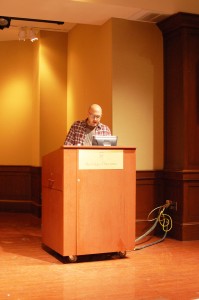By Kevin Schlittenhardt
Correspondent

Author Ben Marcus was only at the podium for a few minutes when he came across profanity in his readings. “Is it okay to curse in here?” he asked. A student in the back of the Library Auditorium shot him a thumbs up, and that was enough approval for the critically acclaimed author.
Ben Marcus, an associate professor at Columbia University, visited the College Tuesday, Feb. 22 to read and speak about his newly released novel, “The Flame Alphabet.”
“The Flame Alphabet” is about a married couple and their teenage child living in an alternate reality America where the voice of children has become a lethal poison harming any adults within ear shot. This eventually leads to children being quarantined and separated from their guilt-ridden parents.
“I chose language because I can’t imagine my life without it,” Marcus said in an interview, explaining how he conjured up the premise for his new story. “I wanted to reverse that and see what would happen.”
Minutes after Marcus began reading, as if to play along with the power of language portrayed in his novel, a light right above him in the auditorium went out. “Did I just make the lights go out?” Marcus wondered out loud, going on to joke, “By the end it’s going to be totally dark, and then it will be a free-for-all.”
Timely technical difficulties aside, Marcus’ readings were piercing as he described a world where children’s voices, normally regarded as cheerful and innocent, “created barriers so putrid you could not cross them.”
Marcus concluded his readings to allow himself time to discuss his writing inspirations. He first started to hear his own voice and perspective in the writings of American author Donald Barthelme. “You had a sense that someone was having a lot of fun, giving you the finger and happened to be in the ‘New Yorker.’”
Speaking more about his writing process, Marcus insisted that no writer should include any aspects in their story that might bore the reader, particularly when using excessive detail to introduce a new character or scene —“projectile detailing” in his own words. “New technologies like cameras do that really well, so I just leave that to the cameras,” Marcus said. “I should just say he was ugly and move.”
Perhaps to the dismay of the professors present at the reading, Marcus denounced the effectiveness of writing classes, stating that “to write well means feeling far more invested in it beyond any school assignment.” Marcus urged students to take the fantasy that brought them to the classroom in the first place and put their own technique on it to make it their own.
“I bet there are a number of you who have stopped listening,” Marcus said to an audience that ironically showed little lack of attentiveness. “Something happened that made you tune out.”
Whether it was true or just a segue, Marcus used this to allude to a grander point. “It’s really hard to make anybody care about anything, especially in writing,” Marcus said. “It’d be nice if we could chain readers to desks and make them read, but we can’t.”






